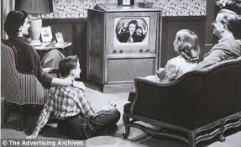
When I reviewed my recent ‘bundled’ telecom bill (for telephone, internet and Fibe TV) this week, the total nearly knocked me on my old lady ass. It was about the same as the mortgage payments on our first house in the seventies. How did this happen? I’ve tried unsuccessfully to cancel some channels only to reinstate them again because my honey needs three thousand sports and movie channels, the car channel and every news channel from the Outer Hebrides to Inner Mongolia. I’m no better with my HGTV, HBO, various History channels and BBC that I’m convinced I couldn’t live without.
That got me thinking about all the services that baby boomers did not grow up with that we cannot imagine surviving without today. Tally up what these luxuries add to our monthly budget expenditures and we get an understanding of why we always feel so broke. Here’s a sampling:

- I remember when a basic phone line cost $15.00 a month, plus long distance charges, which we were very careful to minimize by calling only on weekends and for short periods of time. We received three television stations through an antenna on the roof. Compare that with $350.00 a month today for hundreds of stations but we still have trouble finding something we like.
- Speaking of phones, tally up what your family’s cell phones cost every month. Another $300.00? Or more? More importantly, we actually survived without cell phones not that long ago..
- Mani-pedi’s are de rigueur for most women today to the tune of about $50.00 a month. Many of our mothers never even had a professional mani-pedi and back in the sixties and seventies we always did them ourselves. We also often coloured and cut our own hair to save money.
- Modern washers and dryers are now capable of doing everything but our income taxes. Growing up, we reused wash water for several loads and hung clothes outside to dry. A clothes dryer alone is a huge energy-eater to the tune of another $60.00 per month and that’s if we schedule laundry for the middle of the night or weekends when hydro is cheapest.
- Growing up in the 50s and 60s, families were privileged to own a car. Now, vehicles for every member of the family are lined up in driveways like a used car lot. Factor in the monthly payments for the vehicle, gas, maintenance and insurance and we’re looking at an additional $1,000.00 per month per car and many families have at least two cars.
- Home security anyone? We never even locked our doors half the time when we were growing up and our family lived across the road from a high school. $50.00 per month?

These few items alone total about $2,000.00 per month ($24,000.00 per year in after tax income) and I haven’t even touched on our astronomical hydro bills, bank fees and interest charges on credit cards for merchandise we’ve ordered on line but really didn’t need and probably threw out a few weeks later. Then, there’s the cost of keeping up with the latest fashions, maintenance costs related to skin care, makeup and gym memberships. Nor have I discussed restaurant meals (which were rare for our parents’ generation), entertainment, overseas vacations or expensive hobbies like golf or skiing.
As teenagers, when our pocket money ran out, we were broke until next allowance day or payday at the drive-in burger joint where we worked on weekends. Now, parents shell out continually and without regard for limits. Seeing high school students with expensive designer purses, jeans or sneakers, leather jackets and even their own cars is mind-boggling for those who lived through the Depression.
It’s natural (or at least it used to be) that subsequent generations do better than those who went before. But there’s still a lot of fat that can be trimmed from our monthly budgets that would go a long way to ensuring a financially secure retirement. Just a few decades ago, the majority of young people did not go to university. That was a huge cost-saving but now a university education is considered essential. When I look at the shortages in skilled trades, service jobs and certain occupations, I question the validity of this but that’s another topic for another day.
Being able to afford a house requires discipline. There’s a lot of room for trimming the fat from monthly budgets to build up that down-payment. And your first home doesn’t have to include granite countertops and be located close to work. Certain accommodations and sacrifices must be made to get a foot in the market. On one hand I sympathize with the challenges faced by young people trying to get into the market, while at the same time I sometimes think their expectations are too high. It wasn’t easy for baby boomers when we bought our first place (especially when you consider that mortgage rates were upwards of 20 percent in the 70s), and just as hard for our parents. My parents sold their used car and went without a vehicle for a couple of years to help scrape together the down payment on their first house, and they already had two kids.
 We’ve all grown fat and lazy on the improved standard of living for average North Americans. So many goods and services that were considered luxuries by our parents are now part of our everyday lexicon. In the midst of all this affluence, boomers are also trying to downsize. We’re hauling truckloads of valuable furniture, clothing and other possessions to charity stores and consignment shops. Have we become too smart too late? I’ve started turning off lights to save power, refraining from buying more clothing and shoes I don’t need and generally thinking twice instead of laying down that credit card for an impulse purchase.
We’ve all grown fat and lazy on the improved standard of living for average North Americans. So many goods and services that were considered luxuries by our parents are now part of our everyday lexicon. In the midst of all this affluence, boomers are also trying to downsize. We’re hauling truckloads of valuable furniture, clothing and other possessions to charity stores and consignment shops. Have we become too smart too late? I’ve started turning off lights to save power, refraining from buying more clothing and shoes I don’t need and generally thinking twice instead of laying down that credit card for an impulse purchase.
It’s always been my belief that earned money is more meaningful than handouts. Spoiled children grow up to be entitled adults. There’s something surreal about swiping our so-called Smart phones or credit cards that has inured us to the real value of earned money. It’s like we’re playing with Monopoly money and sometimes we forget how hard the hard stuff is to come by. A quick stop at Starbucks could cost us the equivalent of fifteen minutes working in our employers’ cubicle. As the gap between the rich and poor widens, we’re going to have to become more aware of our spending habits and face the reality that we’re jeopardizing our future security. We could learn a lot by remembering how our parents (who lived through the Great Depression) handled money. Is the cashless society a good thing or a scam and a deceit that will be our ultimate downfall?

Our oceans are full of plastic waste; the polar ice cap is melting; certain species of wildlife are disappearing; thousands of hectares are being stripped of valuable trees and our natural resources won’t last forever. It sounds like a depressing prospect but it’s not too late to change our ways. I don’t envy the Gen Xer’s, Y’s and millennials who’ll be left to clean up the mess. I certainly don’t advocate abandoning technology but maybe there’s some justice in the standard of living pendulum swinging the other way for a few years. Let’s hope this old earth survives long enough to rejuvenate itself. Our standard of living may be better than it was for our parents but is life really better? What started with me questioning my telecom bill now has me reevaluating my entire life. Boy, do I need a glass of wine. Time to chill out.
To order a copy of my latest book BOOMER BEAT from Amazon, click here.




The information overload is just scrambling my brain. Thanks for taking the time to read, to absorb and comment.
Aaah Lynda ,you have hit on what we all should be aware of. I firmly believe we have far too many people with too much technology living on this planet. I am not convinced that so-called climate change and global warming is not something we need to worry about. The climate is always changing. Most people do not realize that if you live in southern Ontario this area was covered with a large ice mass which was quite thick about 20,000 years ago. Then the climate began to change, the ice melted and left us wonderful soil on which to… Read more »